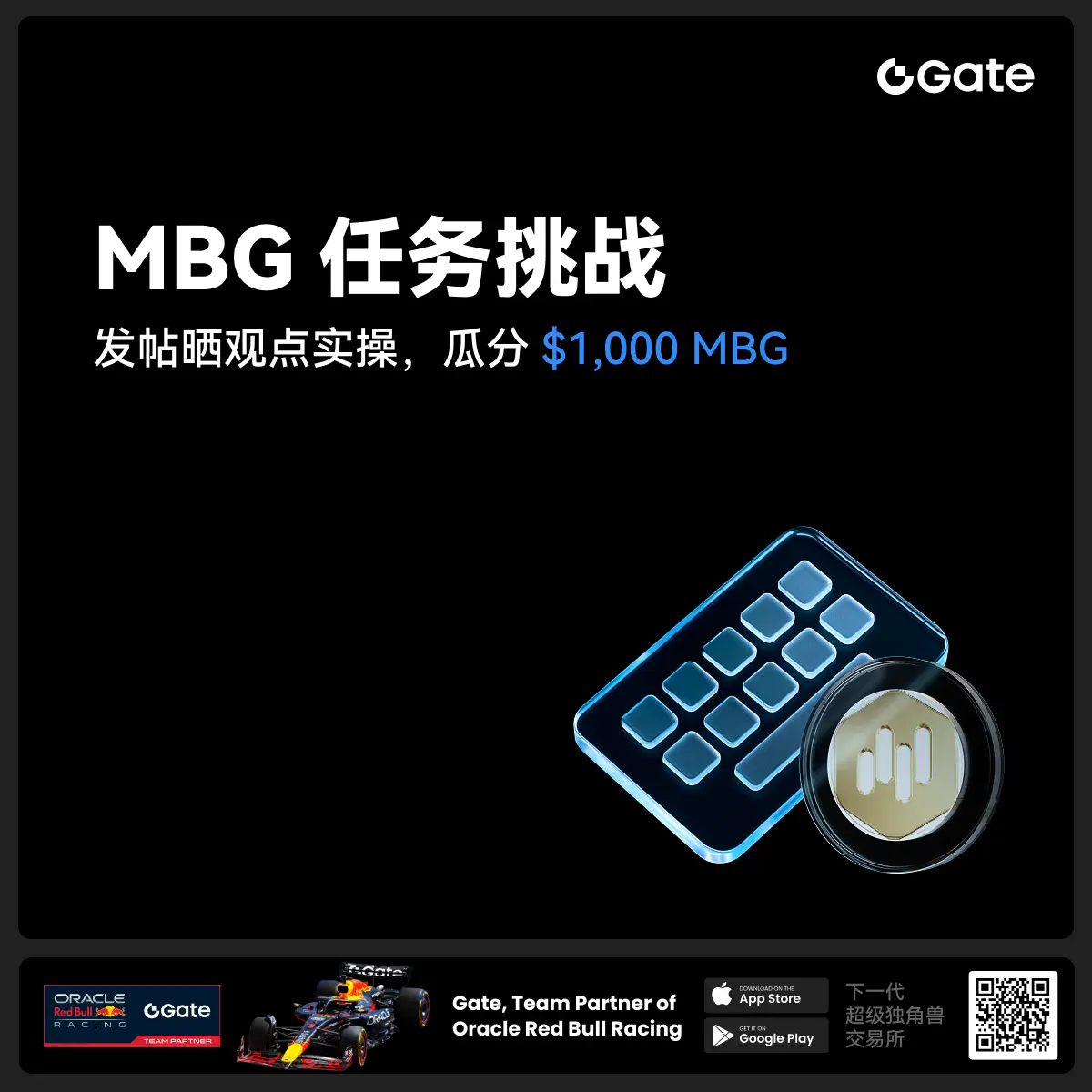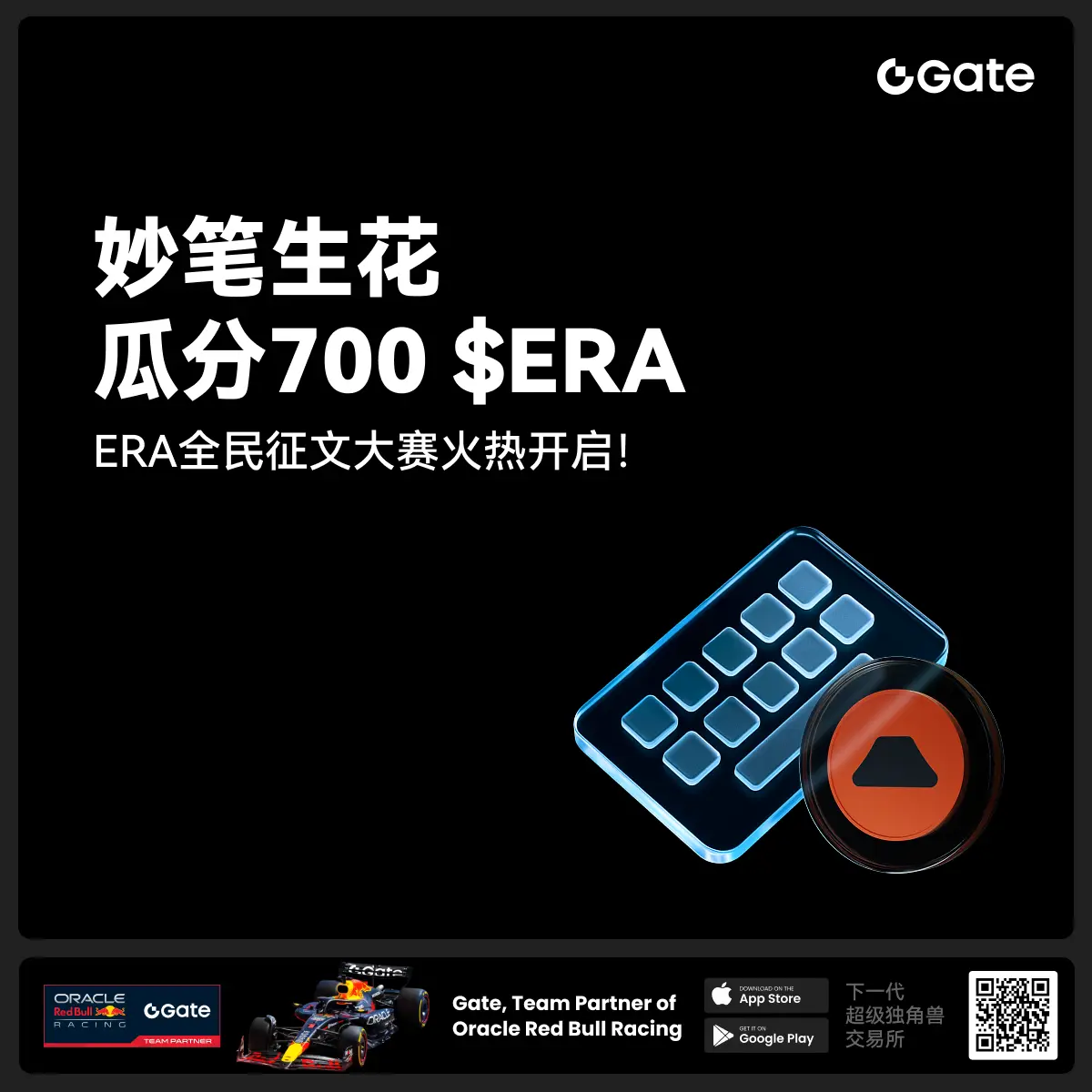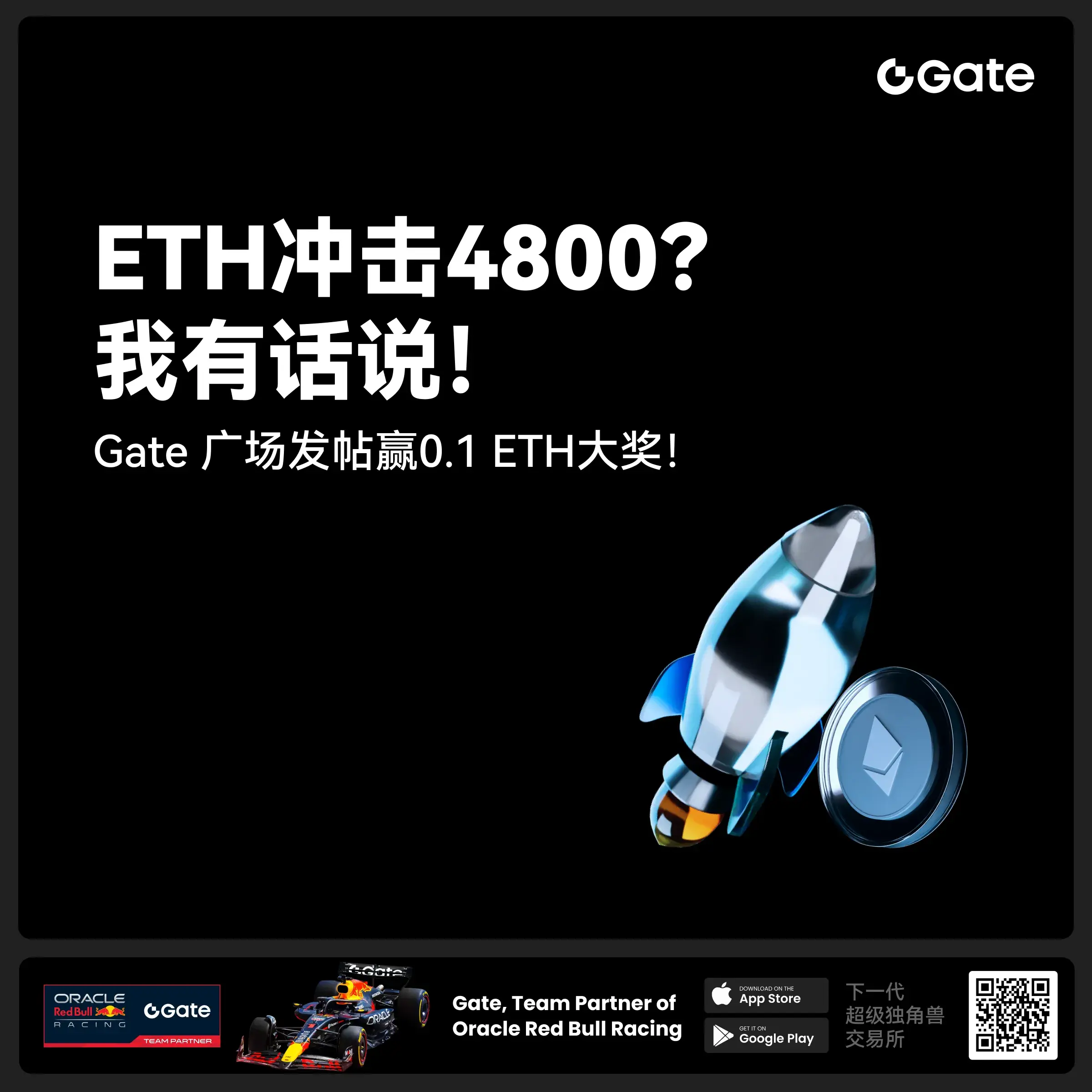- 话题1/3
28276 热度
34257 热度
27090 热度
50806 热度
18793 热度
- 置顶
- 📢 Gate广场 #MBG任务挑战# 发帖赢大奖活动火热开启!
想要瓜分1,000枚MBG?现在就来参与,展示你的洞察与实操,成为MBG推广达人!
💰️ 本期将评选出20位优质发帖用户,每人可轻松获得50枚MBG!
如何参与:
1️⃣ 调研MBG项目
对MBG的基本面、社区治理、发展目标、代币经济模型等方面进行研究,分享你对项目的深度研究。
2️⃣ 参与并分享真实体验
参与MBG相关活动(包括CandyDrop、Launchpool或现货交易),并晒出你的参与截图、收益图或实用教程。可以是收益展示、简明易懂的新手攻略、小窍门,也可以是现货行情点位分析,内容详实优先。
3️⃣ 鼓励带新互动
如果你的帖子吸引到他人参与活动,或者有好友评论“已参与/已交易”,将大幅提升你的获奖概率!
MBG热门活动(帖文需附下列活动链接):
Gate第287期Launchpool:MBG — 质押ETH、MBG即可免费瓜分112,500 MBG,每小时领取奖励!参与攻略见公告:https://www.gate.com/announcements/article/46230
Gate CandyDrop第55期:CandyDrop x MBG — 通过首次交易、交易MBG、邀请好友注册交易即可分187,500 MBG!参与攻略见公告:https://www.gate.com/announcements
- 📢 #Gate广场征文活动第三期# 正式启动!
🎮 本期聚焦:Yooldo Games (ESPORTS)
✍️ 分享独特见解 + 参与互动推广,若同步参与 Gate 第 286 期 Launchpool、CandyDrop 或 Alpha 活动,即可获得任意奖励资格!
💡 内容创作 + 空投参与 = 双重加分,大奖候选人就是你!
💰总奖池:4,464 枚 $ESPORTS
🏆 一等奖(1名):964 枚
🥈 二等奖(5名):每人 400 枚
🥉 三等奖(10名):每人 150 枚
🚀 参与方式:
在 Gate广场发布不少于 300 字的原创文章
添加标签: #Gate广场征文活动第三期#
每篇文章需 ≥3 个互动(点赞 / 评论 / 转发)
发布参与 Launchpool / CandyDrop / Alpha 任一活动的截图,作为获奖资格凭证
同步转发至 X(推特)可增加获奖概率,标签:#GateSquare 👉 https://www.gate.com/questionnaire/6907
🎯 双倍奖励机会:参与第 286 期 Launchpool!
质押 BTC 或 ESPORTS,瓜分 803,571 枚 $ESPORTS,每小时发放
时间:7 月 21 日 20:00 – 7 月 25 日 20:00(UTC+8)
🧠 写作方向建议:
Yooldo
- 🎉Gate 2025 上半年社区盛典:内容达人评选投票火热进行中 🎉
🏆 谁将成为前十位 #Gate广场# 内容达人?
投票现已开启,选出你的心头好
🎁赢取 iPhone 16 Pro Max、限量周边等好礼!
📅投票截止:8 月 15 日 10:00(UTC+8)
立即投票: https://www.gate.com/activities/community-vote
活动详情: https://www.gate.com/announcements/article/45974
- 📢 #Gate广场征文活动第二期# 正式启动!
分享你对 $ERA 项目的独特观点,推广ERA上线活动, 700 $ERA 等你来赢!
💰 奖励:
一等奖(1名): 100枚 $ERA
二等奖(5名): 每人 60 枚 $ERA
三等奖(10名): 每人 30 枚 $ERA
👉 参与方式:
1.在 Gate广场发布你对 ERA 项目的独到见解贴文
2.在贴文中添加标签: #Gate广场征文活动第二期# ,贴文字数不低于300字
3.将你的文章或观点同步到X,加上标签:Gate Square 和 ERA
4.征文内容涵盖但不限于以下创作方向:
ERA 项目亮点:作为区块链基础设施公司,ERA 拥有哪些核心优势?
ERA 代币经济模型:如何保障代币的长期价值及生态可持续发展?
参与并推广 Gate x Caldera (ERA) 生态周活动。点击查看活动详情:https://www.gate.com/announcements/article/46169。
欢迎围绕上述主题,或从其他独特视角提出您的见解与建议。
⚠️ 活动要求:
原创内容,至少 300 字, 重复或抄袭内容将被淘汰。
不得使用 #Gate广场征文活动第二期# 和 #ERA# 以外的任何标签。
每篇文章必须获得 至少3个互动,否则无法获得奖励
鼓励图文并茂、深度分析,观点独到。
⏰ 活动时间:2025年7月20日 17
- 📢 ETH冲击4800?我有话说!快来“Gate广场”秀操作,0.1 ETH大奖等你拿!
牛市预言家,可能下一个就是你!想让你的观点成为广场热搜、赢下ETH大奖?现在就是机会!
💰️ 广场5位优质发帖用户+X浏览量前5发帖用户,瓜分0.1 ETH!
🎮 活动怎么玩,0门槛瓜分ETH!
1.话题不服来辩!
带 #ETH冲击4800# 和 #ETH# 在 广场 或 K线ETH下 围绕一下主题展开讨论:
-ETH是否有望突破4800?
-你看好ETH的原因是什么?
-你的ETH持仓策略是?
-ETH能否引领下一轮牛市?
2. X平台同步嗨
在X平台发帖讨论,记得带 #GateSquare# 和 #ETH冲击4800# 标签!
把你X返链接提交以下表单以瓜分大奖:https://www.gate.com/questionnaire/6896
✨发帖要求:
-内容须原创,字数不少于100字,且带活动指定标签
-配图、行情截图、分析看法加分,图文并茂更易精选
-禁止AI写手和灌水刷屏,一旦发现取消奖励资格
-观点鲜明、逻辑清晰,越有料越好!
关注ETH风向,创造观点价值,从广场发帖开始!下一个牛市“预言家”,可能就是你!🦾🏆
⏰ 活动时间:2025年7月18日 16:00 - 2025年7月28日 23:59(UTC+8)
【立即发帖】 展现你的真知灼见,赢取属于你的ETH大奖!
Pantera Capital:我们为什么投资Worldcoin?
作者:Cosmo Jiang, Cody Poh
编译:深潮TechFlow
我们一直在研究区块链如何融入一个 AI 快速普及的世界,其中“人类证明”(Proof-of-human)是一个突出的领域。在一个人工智能代理和AI生成内容日益普及的未来,区分人类与机器人将成为一种迫切需求。对于许多场景,我们可能接受甚至更喜欢与机器人互动。然而,在广告、约会或政府服务等关键领域,认证独特的真人身份则显得尤为重要。而使用去许可的区块链,能够以全球化且抗审查的方式验证在线“人类性”,无疑是最好的选择之一。
World(前身为 Worldcoin)是一个区块链协议,通过“人类证明”理念,构建了一个隐私保护的全球身份与金融网络。“人类证明”意指证明一个人既是人类又是独一无二的。World 通过其生物识别设备“World Orb”进行虹膜扫描,认证用户为独特的真人,并在其区块链 Worldchain 上为每位用户颁发一个 World ID。由 Tools For Humanity(TFH)开发的这套技术,正在全球范围内推广。World 协议的原生代币 WLD 被设计为全球互联网货币,并用于协议治理。
OpenAI 的首席执行官 Sam Altman 同时也是 World 的联合创始人。他创立 World 的初衷是为了在一个充满AI驱动内容的互联网世界中,让人类保持独特性和核心地位。如果 World 得到广泛采用,它将为区分真人与AI提供一个可扩展且可靠的全球解决方案,同时保护用户隐私。这种能力带来了深远影响,不仅能扩大经济机会,还能促进全球民主进程。
自去年投资以来,我们有幸与 Sam Altman、TFH 首席执行官 Alex Blania 以及团队成员会面。World 于 4 月 30 日举办了最新的公开活动,为投资者和行业人士深入介绍了其产品路线图和增长战略。基于此,我们认为这是一个分享我们投资逻辑的绝佳时机,并展望即将到来的令人兴奋的进展。
投资逻辑概述
我们相信,World 的“人类证明”解决方案将在人类与AI共存的未来成为关键基础设施。我们的投资逻辑主要基于以下几个原因:
World 的愿景不仅是技术上的创新,更是对未来社会结构的深刻思考。在AI与区块链的交汇点上,它或许将成为连接人类与技术的关键桥梁。
World ID应用场景和潜力
我们认为“人类证明”对于许多应用场景至关重要,而 World ID 在规模化商业应用中可能具有显著潜力。尤其是在广告和政府服务领域,World ID能够带来巨大收益。考虑到这些终端市场的规模——广告业是一个万亿美元市场,政府服务占美国GDP的25%——即便是通过独特的人类身份解决方案增加少量价值,也代表着 World 的巨大增长机遇。
World 在短期内识别出游戏、约会和社交网络为三个核心应用场景,通过区分独特的人类与机器人,显著提升用户体验。协议已在这些领域建立了合作关系:
World 的 Mini App生态系统在解锁 World ID的新可能性和应用场景中发挥了关键作用。目前,World App 上有超过300个Mini App,它们都可以利用 World ID 和 World App 钱包,促进创意实验和概念验证。虽然未来应用场景的潜力尚未完全开发,但早期实验显示出良好前景:
World Chain 本身的构建方式为经过验证的人类提供了独特的优势。经过验证的人类的燃气费由从非验证人类(即机器人)收集的费用补贴,这确保了人类从链上代理商增加的商业活动中受益。
分发战略
World 是一个网络,而网络的价值随着用户数量的增加而提升。目前,World 的网络还处于起步阶段,仅有 1200 万经过验证的用户,因此用户获取是当前的重中之重。免费的代币激励机制类似于 PayPal 早期的“10 美元增长黑客”策略。然而,由于初次验证需要面对面的身份认证,当前的瓶颈实际上是设备的物理分发。要将 World 扩展到下一个 1 亿用户,关键在于提升 Orb 设备在制造和跨司法管辖区分发方面的可扩展性。
为了实现这一目标,World 正在加速 Orb 的生产,旨在使其设备像 ATM 一样普及并易于获取。团队开发了一种自助式 Orb,用户可以无需工作人员协助独立操作,从而实现全球大规模部署并降低运营成本。同时,World 正在开发一种更便携的验证设备 Orb Mini,其外形类似智能手机。Orb Mini 预计将在 2026 年部署,有望成为将网络用户扩展到 1 亿以上的关键工具。
在通过物理分发和经济激励推动验证之后,下一个挑战是通过构建实际应用场景来提高用户留存率。扩展 World 的 Mini App 生态系统对于用户增长和参与度至关重要。截至目前,World App 的下载量已超过 5500 万次,这一生态系统正逐步成为用户日常互动的基础,并为加速用户获取提供了可扩展的杠杆。我们已开始看到一些有趣的应用程序的出现,涵盖了从 DeFi 到游戏再到社交媒体的多个领域。
我们认为,今年在美国的启动是一次关键的增长解锁。World 于 5 月宣布在美国启动,首批覆盖六个城市(亚特兰大、奥斯汀、洛杉矶、迈阿密、纳什维尔和旧金山)。World 计划到 2025 年底,仅在美国就部署 7500 台 Orb 设备。他们还预计通过与零售合作伙伴的市场推广活动,在全国范围内的高密度购物场所提供 World 设备。
World 的目标是在今年年底前验证 5000 万人,并以签约每一位独特人类为长期愿景。你可以通过 此处 查找附近的扫描地点。
此外,World 最近在美国推出了首支商业广告,名为《Human and You Know It》(“人类的独特性,你值得拥有”)。你可以查看广告内容。
政府关系
许多人仍然认为 World 规避隐私法律和政府法规,但事实完全相反。这种误解源于过去的监管行动。谨慎的政府监管机构曾对 World 的扩展提出挑战,要求其暂停在部分地区的运营,例如中国香港、肯尼亚、西班牙和葡萄牙。
近年来,监管态度发生了积极变化。这种转变归因于多个因素,包括 TFH(The Foundation for Humanity)加强教育和与地方政府的沟通,以及人工智能的加速普及,让各界认识到需要以开放的心态学习和适应新的世界范式。
最近,World 在与地方政府合作方面取得了显著进展,特别是在数字化发展迅速的东南亚市场,如泰国、菲律宾和印度尼西亚。在进入这些市场之前,World 积极与政府官员接洽,确保他们充分了解平台的技术及其内嵌的隐私保护措施。为满足数据隐私和存储的监管要求,World 组建了一支顶尖的法律与公共政策团队。
一个成功的例子是 World 与马来西亚政府服务提供商 MyEG 的合作。MyEG 提供如驾驶执照考试、身份证申请和更新等线下服务。通过与 MyEG 合作,Orb 验证服务被整合到其现有的政府基础设施中,这展示了 World 技术嵌入政府服务的能力,为未来类似合作树立了典范。
商业化与潜在增长
在名为“At Last”的活动中,World 开始初步阐述其对 World ID 商业化的规划。从最基本的层面来看,收入来源包括 World Chain 上的交易手续费。此外,还引入了 World ID 服务费用(World ID Fees),这将向使用 World ID 服务的应用程序收取。费用分为两部分:凭证费用(Credential Fees),由凭证发行方保留;协议费用(Protocol Fees),则归 World ID 所有。作为基础投资者,我们对 World 公布的价值积累计划感到振奋,因为这表明 World 协议成功为其利益相关方创造了超额价值。
通过合理的假设,可以构建一个令人信服的投资案例。如果 World 能验证 50 亿独特的用户(约占全球总人口的 60%),并且每位经过验证的用户每年能带来 5 美元的收入,那么该协议将实现 250 亿美元的年化收入。而这 5 美元仅占全球人均 GDP 的不到 0.005%,考虑到 World 技术在广告等巨大市场的广泛应用,这样的占比是合理的。
在一个合理的增长倍数下,这 250 亿美元的年化收入,结合接近 100% 的自由现金流转化率,有可能推动市值超过 2500 亿美元。这些数据展示了 World ID 在全球范围内的商业化潜力以及未来的巨大市场价值。
结语
我们对 World 团队正在推进的发展充满信心。该协议在快速发展的人工智能时代,独特地解决了验证独特人类身份这一关键挑战。这一机遇尤为及时,伴随着政府对数字身份态度的转变、World 最近进入美国市场,以及 World ID 在不同地区和多样化场景中的日益广泛应用。
当然,从现状到实现 World 的长期愿景还有很长的路要走。关于协议是否能足够快地实现规模化、其增长激励机制的有效性,以及其波动性加密货币的反身性影响等问题,仍然值得深思。此外,World 并非唯一意识到“人类身份”这一关键基础的机构,大多数大型科技公司也在开发自己的身份解决方案。尽管去中心化且抗审查的解决方案在理论上更优,但这并不意味着它一定会在实践中胜出。
随着人工智能的普及,人们越来越认识到,World 构建强大且安全的身份验证解决方案的使命具有重要意义,值得为之努力。《华尔街日报》和《时代》杂志在过去几个月中分别对 World 进行了专题报道,强调了其在未来人工智能代理日益普及且难以区分的背景下的重要作用,尤其是在支付和社交网络领域。Blackrock(贝莱德)在其年度股东信中也重申了“人类身份验证”的战略重要性,特别是在链上经济和资产代币化不断增长的背景下。
尽管到目前为止,World 的发展仍处于早期阶段,但毫无疑问,这是一支由 Sam Altman 担任董事会主席领导的卓越管理团队。如果成功,其“宏大且大胆的目标”(BHAG)将带来数量级的增长潜力。展望未来,我们期待 World 在地理扩展、战略合作伙伴关系以及 Mini App 生态系统的强劲增长方面持续取得进展。作为这一协议的投资者,我们感到无比兴奋与荣幸。